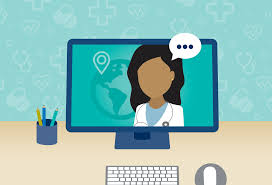Telehealth Startups Bringing Healthcare to the Small Screen
The need for self-diagnosis and home medical care is growing. Following two difficult years of health management, the Telehealth industry is booming. You only have to look at a handful of big startups to see why. Let’s take a closer look at what’s going on in this niche.

What is Telehealth?
Telehealth, crucially, is dedicated healthcare made remote. With working from home having boomed over the past year, healthcare has matched the trend. This is primarily attributed to a rising need for social distancing. Moreover, evolving technology and increasing demand for convenience have played big parts.
Telehealth startups work to provide users with medical advice and assistance from afar. Rather than seeing a doctor or nurse up-close, users of apps and services can log in on a smartphone. They can access therapy, re-order medication, and more. Some developments even include artificial intelligence.
It may be simple to think this niche has little variation. However, this is where innovative venture founders spring up to surprise us.
Telehealth Startups Changing the World
A key player in the recent Telehealth boom is Cambridge, Massachusetts-based Thrive Earlier Detection. TED provides remote cancer detection as well as adaptability for existing medical services. The firm’s technology aims to help detect and test for cancers earlier than the standard - thus potentially saving many lives.
The company is already picking up incredible interest, with a Series B round ending in $257 million funding.
Livongo, meanwhile, takes a slightly different approach. This remote healthcare service is aimed at people striving to make a difference. The service, based out of Mountain View, CA, is funded to more than $235 million. Their service allows users to track health trends and learn how to make simple changes.
This service doesn’t dig deep into health concern analysis but does provide valuable, actionable solutions. Even more interesting is the fact that Livongo has merged with Teladoc. Teladoc is another venture that focuses more on offering 24-hour doctor care via video. The fact both services now act as one is a massive boost to home diagnosis.
23andMe is perhaps one of the best-known startups in the niche. This service has expanded hugely over the years, allowing people to analyze their DNA. It emerged initially as a genealogy service. Now, however, it helps people to learn more about predisposition and treatments available.
Crucially, these companies demonstrate that telehealth is more than just ‘medical treatments over Zoom’. The sphere pivots towards people who want to actively change their lifestyles, too.
Telehealth is Here to Stay
The telehealth boom was certainly aided by medical necessity since the start of 2020. However, thanks to technological innovation and prevalence, it was always inevitable. It is an exciting time for anyone who needs medical help but may not have direct doctor access.
Healthcare related startups are a group often found getting new funding, including dental credentialing services.
Fundz may help you find the next big telehealth phenomenon.
Topic: Startups